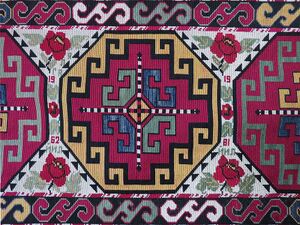Tosek (Orzu): Difference between revisions
No edit summary |
No edit summary |
||
| (2 intermediate revisions by the same user not shown) | |||
| Line 1: | Line 1: | ||
[[File:Tosek.jpg|300px|thumb|A traditional Orkuzi quilt from a market in Sankt.]] | [[File:Tosek.jpg|300px|thumb|A traditional Orkuzi quilt from a market in Sankt.]] | ||
The '''Tosek''' is an informal Orkuzi term, that refers to the mode of ordering of space in Orkuzi political tradition. Modern scholars see Tosek as very important to understanding Orzu today, since it allows Orzu to cooperate as one, while permitting the existence of heterogeneous political formations. Under Tosek the region is united by a sole spiritual authority, one concerned with the final ends of things, theology, arts, and the sciences. The spiritual authority gives legitimacy to a multitude of distinct political formations (ex companies, sovcorps, militias, tribal councils), with differing levels of power, responsibilities, and control. It is seen as a quilt of local political formations, all united and woven together by spiritual power. The spiritual power is seen as the guarantor of national harmony - possessing the unique ability to be the final decider in disputes. In normal periods, however, it is to stay out of politics - merely concerned with the sciences, spiritual advice and | The '''Tosek''' is an informal Orkuzi term, that refers to the mode of ordering of space in Orkuzi political tradition. Modern scholars see Tosek as very important to understanding Orzu today, since it allows Orzu to cooperate as one, while permitting the existence of heterogeneous political formations. Under Tosek the region is united by a sole spiritual authority, one concerned with the final ends of things, theology, arts, and the sciences. The spiritual authority gives legitimacy to a multitude of distinct political formations (ex companies, sovcorps, militias, tribal councils), with differing levels of power, responsibilities, and control. It is seen as a quilt of local political formations, all united and woven together by spiritual power. The spiritual power is seen as the guarantor of national harmony - possessing the unique ability to be the final decider in disputes. In normal periods, however, it is to stay out of politics - merely concerned with the sciences, spiritual advice and the creation of art. The Tosek is seen as a rejection of the [insert whatever Westphalia is in Aeia here] state, for a heterogenous order suited to Orkuzi culture. Due to Tosek, Orzu possesses no unified legal code nor a written Constitution, instead having a diversity of political formations, with wealthy cities with an Asuran legal code and traditional tribal entities coexisting. | ||
==History== | |||
==Theory== | |||
==Modern day== | |||
Latest revision as of 04:26, 23 April 2020
The Tosek is an informal Orkuzi term, that refers to the mode of ordering of space in Orkuzi political tradition. Modern scholars see Tosek as very important to understanding Orzu today, since it allows Orzu to cooperate as one, while permitting the existence of heterogeneous political formations. Under Tosek the region is united by a sole spiritual authority, one concerned with the final ends of things, theology, arts, and the sciences. The spiritual authority gives legitimacy to a multitude of distinct political formations (ex companies, sovcorps, militias, tribal councils), with differing levels of power, responsibilities, and control. It is seen as a quilt of local political formations, all united and woven together by spiritual power. The spiritual power is seen as the guarantor of national harmony - possessing the unique ability to be the final decider in disputes. In normal periods, however, it is to stay out of politics - merely concerned with the sciences, spiritual advice and the creation of art. The Tosek is seen as a rejection of the [insert whatever Westphalia is in Aeia here] state, for a heterogenous order suited to Orkuzi culture. Due to Tosek, Orzu possesses no unified legal code nor a written Constitution, instead having a diversity of political formations, with wealthy cities with an Asuran legal code and traditional tribal entities coexisting.
